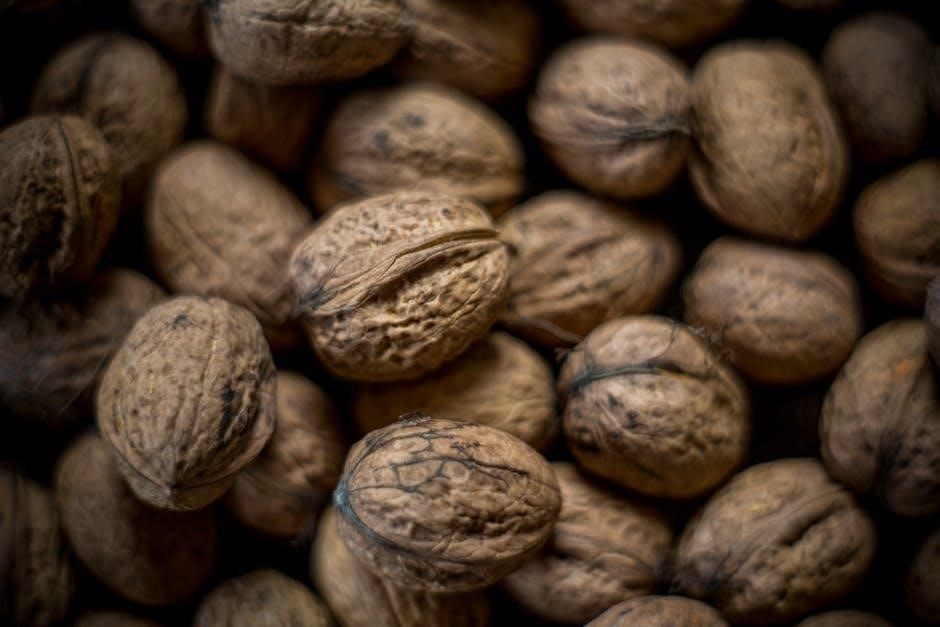This book by Uma Naidoo‚ MD‚ explores the connection between nutrition and mental health‚ offering insights into how specific foods can combat depression‚ anxiety‚ PTSD‚ OCD‚ ADHD‚ and more.
1.1 Overview of the Book and Its Purpose
“This Is Your Brain on Food” by Uma Naidoo‚ MD‚ is an essential guide that explores the profound impact of nutrition on mental health. The book reveals how specific foods can combat conditions like depression‚ anxiety‚ PTSD‚ OCD‚ ADHD‚ and more. It provides a comprehensive overview of the scientifically-backed relationship between diet and brain function‚ offering practical strategies to improve mental well-being through dietary choices. The purpose of the book is to educate readers on how to harness the power of food to enhance their mental health and overall quality of life.
1.2 The Author: Uma Naidoo‚ MD
Uma Naidoo‚ MD is a Harvard-trained psychiatrist and nutrition expert specializing in nutritional psychiatry. As the Director of Nutritional and Lifestyle Psychiatry at Massachusetts General Hospital‚ she combines her expertise in mental health and nutrition to promote holistic well-being. Dr. Naidoo is also a professional chef‚ blending her culinary skills with medical knowledge to advocate for food as medicine. Her work focuses on transforming mental health care by integrating dietary interventions into treatment plans‚ making her a leading voice in the field of nutritional psychiatry.
1.3 The Importance of Nutrition in Mental Health
Nutrition plays a vital role in mental health by directly influencing brain function and emotional well-being. The gut-brain axis highlights how dietary choices impact neurotransmitter production and mood regulation. A lack of essential nutrients can exacerbate conditions like depression and anxiety‚ while a balanced diet rich in vitamins‚ minerals‚ and antioxidants supports cognitive health. By addressing nutritional deficiencies‚ individuals can improve mental clarity‚ stabilize emotions‚ and foster resilience against mental health disorders‚ making food a powerful tool in overall brain wellness.

The Science Behind Food and Brain Function
Food directly impacts brain function through the gut-brain axis‚ influencing neurotransmitters‚ inflammation‚ and brain chemistry. Diet shapes cognitive health‚ mood‚ and mental clarity‚ linking nutrition to brain performance.
2.1 How the Gut and Brain Are Connected
The gut and brain are interconnected through the vagus nerve and bidirectional communication pathways. The gut microbiome produces neurotransmitters like serotonin and dopamine‚ influencing mood and cognitive function. This gut-brain axis highlights how dietary choices impact mental health‚ as an imbalance in gut bacteria can lead to neurological and psychiatric conditions. Understanding this relationship emphasizes the importance of nutrition in maintaining brain health and overall well-being.
2.2 The Role of Neurotransmitters in Mental Health
Neurotransmitters‚ such as serotonin‚ dopamine‚ and norepinephrine‚ play a crucial role in regulating mood‚ motivation‚ and emotional responses. They act as messengers between brain cells‚ influencing mental health conditions like depression and anxiety. Diet directly impacts neurotransmitter production‚ as certain nutrients like amino acids and B vitamins are essential for their synthesis. Imbalances in these chemicals can lead to mood disorders‚ emphasizing the importance of nutrition in maintaining optimal neurotransmitter function and overall mental well-being.
2.3 The Impact of Diet on Brain Chemistry
Diet significantly influences brain chemistry by altering the levels of neurotransmitters and hormones that regulate mood and cognitive function. Foods rich in antioxidants‚ such as berries‚ reduce inflammation‚ while omega-3 fatty acids from fish support brain structure. A diet high in fiber promotes gut health‚ which produces neurotransmitters like serotonin. Conversely‚ processed foods and refined sugars can disrupt brain chemistry‚ leading to imbalances. Understanding how specific nutrients affect brain function highlights the importance of diet in maintaining mental health and cognitive clarity.
Foods That Combat Depression
Nutrient-rich foods like fatty fish‚ berries‚ and whole grains help reduce depression symptoms by supporting brain health and balancing neurotransmitters‚ promoting mental well-being naturally.
3.1 The Link Between Nutrition and Depression
Nutrition plays a critical role in depression‚ as certain foods influence neurotransmitters like serotonin and dopamine‚ which regulate mood. Diets lacking essential nutrients can impair brain function‚ exacerbating symptoms. Research highlights that-inflammatory foods and sugar spikes contribute to depression‚ while nutrient-dense foods promote mental health. The gut-brain axis further underscores how dietary choices directly impact emotional well-being‚ making nutrition a powerful tool in managing and preventing depression. A balanced diet rich in vitamins‚ minerals‚ and antioxidants supports optimal brain health and mood stability.
3.2 Foods Rich in Omega-3 Fatty Acids
Fatty fish such as salmon‚ mackerel‚ sardines‚ and tuna are rich in Omega-3 fatty acids‚ particularly EPA and DHA‚ which are vital for brain health. Plant-based sources like flaxseeds‚ chia seeds‚ and walnuts provide ALA. Omega-3s support brain cell structure‚ reduce inflammation‚ and enhance neurotransmitter activity. Studies suggest that regular consumption of these foods can alleviate depressive symptoms and improve mental well-being by ensuring a balanced intake of essential fatty acids.

3.3 The Benefits of Antioxidants and Polyphenols

Antioxidants and polyphenols play a crucial role in protecting the brain from oxidative stress and inflammation‚ which are linked to depression. Foods like berries‚ dark chocolate‚ and green tea are rich in these compounds. They neutralize free radicals‚ enhancing brain health and cognitive function. Polyphenols also promote gut health‚ improving nutrient absorption. Incorporating these foods into your diet can reduce inflammation‚ boost mood‚ and support overall mental well-being by safeguarding brain cells from damage and fostering a balanced neurological environment.

Addressing Anxiety Through Diet
Diet plays a pivotal role in managing anxiety by influencing neurotransmitter balance and reducing inflammation. A nutrient-dense diet rich in whole foods supports brain health and calms the mind.
4.1 How Food Choices Influence Anxiety Levels
Food choices significantly impact anxiety levels by affecting neurotransmitter balance‚ inflammation‚ and gut health. Diets high in refined sugars and processed foods can exacerbate anxiety due to rapid blood sugar fluctuations and inflammation. Conversely‚ nutrient-dense foods like fruits‚ vegetables‚ and lean proteins support serotonin production‚ stabilizing mood. The gut-brain axis plays a key role‚ as an imbalanced microbiome can trigger anxiety symptoms. Prioritizing whole‚ anti-inflammatory foods helps regulate stress hormones and promotes mental calmness‚ offering a dietary approach to managing anxiety effectively.
4.2 The Calming Effects of Complex Carbohydrates
Complex carbohydrates‚ such as whole grains‚ vegetables‚ and legumes‚ have a calming effect on the brain by increasing serotonin levels‚ which helps reduce anxiety. These foods are rich in fiber‚ promoting steady digestion and preventing blood sugar spikes. The slow release of glucose stabilizes mood and energy‚ while the fermentation of dietary fiber by gut bacteria produces calming short-chain fatty acids. Incorporating complex carbs into meals can create a sense of relaxation and improve emotional resilience‚ making them a valuable tool in managing anxiety.
4.3 The Role of Magnesium and Vitamin D
Magnesium and vitamin D play significant roles in mitigating anxiety by supporting brain health and nervous system function. Magnesium helps regulate neurotransmitters like serotonin and dopamine‚ promoting relaxation and reducing stress. It also lowers cortisol levels‚ the body’s main stress hormone. Vitamin D‚ often termed the “sunshine vitamin‚” influences mood regulation by interacting with brain receptors that control emotional responses. Deficiencies in these nutrients can exacerbate anxiety symptoms‚ making supplementation or dietary adjustments crucial for mental well-being.

Fighting PTSD with Nutrient-Dense Foods
Nutrient-dense foods play a crucial role in addressing PTSD by supporting brain health and reducing symptoms. A diet rich in antioxidants and omega-3s aids emotional recovery and resilience.
5.1 The Connection Between PTSD and Nutrition
Research highlights a strong link between PTSD and nutritional deficiencies‚ as malnutrition can exacerbate symptoms like anxiety and cognitive fog. A diet lacking essential nutrients disrupts brain chemistry‚ worsening emotional regulation. Conversely‚ nutrient-dense foods rich in vitamins‚ minerals‚ and antioxidants support brain health‚ reducing inflammation and promoting neurotransmitter balance. Addressing nutritional gaps is crucial for managing PTSD symptoms‚ as proper nutrition fosters resilience and aids in emotional recovery. This connection underscores the importance of dietary interventions in holistic PTSD treatment plans.
5.2 The Anti-Inflammatory Properties of Certain Foods
Certain foods possess potent anti-inflammatory properties‚ which play a crucial role in alleviating PTSD symptoms. Chronic inflammation is linked to brain dysfunction and emotional distress. Foods like omega-3 rich fish‚ turmeric‚ and leafy greens help reduce inflammation by modulating immune responses and repairing neural tissue. These nutrients promote a balanced inflammatory response‚ easing PTSD-related hyperarousal and emotional reactivity. Incorporating anti-inflammatory foods into the diet can significantly support mental health recovery and overall well-being for individuals with PTSD.
5;3 The Importance of Hydration and Electrolytes
Hydration and electrolyte balance are essential for brain health‚ particularly for individuals with PTSD. Even mild dehydration can exacerbate symptoms like fatigue and brain fog‚ worsening emotional distress. Electrolytes‚ such as potassium‚ magnesium‚ and sodium‚ regulate water balance and nerve function‚ which are critical for stabilizing mood and reducing anxiety. Proper hydration supports the clearance of toxins from the brain‚ while electrolytes help maintain neural communication. Prioritizing water-rich foods and electrolyte-dense beverages can significantly enhance mental clarity and emotional resilience in PTSD management.

Managing OCD Through Dietary Interventions
Dietary interventions play a crucial role in managing OCD symptoms. Reducing sugar intake‚ increasing omega-3s‚ and incorporating vitamin D can help alleviate obsessive thoughts and compulsions more effectively.
6.1 The Relationship Between OCD and Gut Health
Research highlights a strong link between OCD and gut health‚ suggesting that imbalances in the gut microbiome may exacerbate symptoms. The gut-brain axis plays a pivotal role‚ as an unhealthy gut can lead to inflammation‚ which may contribute to obsessive and compulsive behaviors. Addressing gut health through dietary changes can potentially alleviate OCD symptoms‚ offering a complementary approach to traditional treatments. A balanced gut microbiome supports overall brain health‚ making it a critical area of focus for managing OCD effectively.
6.2 The Impact of Probiotics on Mental Health
Probiotics play a significant role in mental health by fostering a healthy gut microbiome‚ which directly influences brain function. These beneficial bacteria reduce inflammation‚ stabilize the gut lining‚ and produce neurotransmitters like serotonin and dopamine. Studies suggest probiotics can alleviate symptoms of anxiety‚ depression‚ and OCD by modulating the gut-brain axis. Incorporating probiotic-rich foods‚ such as yogurt and fermented vegetables‚ into the diet may enhance mental well-being and support emotional resilience. A balanced gut microbiome is essential for optimal mental health outcomes.
6.3 Foods That Support Serotonin Production
Foods rich in tryptophan‚ an amino acid that converts into serotonin‚ are crucial for mental health. Turkey‚ chicken‚ fish‚ and plant-based sources like beans and lentils are excellent choices. Omega-3 fatty acids in fatty fish‚ such as salmon and mackerel‚ also support serotonin production. Vitamin D‚ found in these fish‚ enhances serotonin synthesis. Additionally‚ folate-rich foods like spinach and kale contribute to serotonin regulation. Incorporating complex carbohydrates‚ such as whole grains and fruits‚ further supports neurotransmitter balance‚ promoting emotional stability and reducing symptoms of anxiety and depression.

Food Strategies for ADHD
Dietary adjustments play a crucial role in managing ADHD symptoms by improving focus and reducing hyperactivity through targeted nutritional approaches.
7.1 How Diet Affects Attention and Focus
Diet plays a significant role in attention and focus‚ particularly for individuals with ADHD. Certain foods and nutrients directly impact brain function‚ influencing symptoms like inattention and hyperactivity. Omega-3 fatty acids‚ zinc‚ and iron are essential for optimal brain health‚ while deficiencies can exacerbate ADHD symptoms. Blood sugar fluctuations from refined carbs can impair focus‚ whereas complex carbs and protein provide steady energy. A balanced diet rich in whole foods supports better cognitive performance and emotional regulation‚ helping individuals maintain concentration and reduce impulsivity.
7.2 The Benefits of a Balanced Macronutrient Intake
A balanced intake of carbohydrates‚ proteins‚ and fats is crucial for maintaining focus and reducing ADHD symptoms. Carbohydrates provide quick energy‚ while proteins support neurotransmitter function‚ and healthy fats‚ like omega-3s‚ promote brain health. A balanced macronutrient diet helps stabilize blood sugar levels‚ preventing energy crashes and improving concentration. This balance also supports the production of dopamine and norepinephrine‚ key neurotransmitters for attention regulation. By combining these nutrients‚ individuals can experience enhanced cognitive function and better emotional stability.
7.3 Avoiding Artificial Additives and Preservatives
Artificial additives and preservatives in processed foods can exacerbate ADHD symptoms by disrupting brain function. These chemicals‚ such as artificial colors and flavors‚ can trigger hyperactivity and inattention in some individuals. Eliminating them from the diet reduces inflammation and supports clearer thinking. Natural‚ whole foods provide essential nutrients without harmful additives. Avoiding processed foods helps maintain stable energy levels and improves focus. This dietary adjustment‚ combined with a balanced macronutrient intake‚ creates a more conducive environment for managing ADHD symptoms effectively.

The Role of Specific Foods in Mental Health
Specific foods play a vital role in maintaining and improving mental health by providing essential nutrients that support brain function and emotional well-being.
8.1 The Benefits of Fermented Foods
Fermented foods‚ such as kimchi‚ sauerkraut‚ and kefir‚ offer significant mental health benefits due to their rich probiotic content. Probiotics support gut microbiome health‚ which is closely linked to brain function. These foods enhance neurotransmitter production‚ like serotonin and dopamine‚ improving mood and reducing anxiety. Fermented foods also contain antioxidants and B vitamins‚ which combat oxidative stress and inflammation‚ further promoting brain health. Incorporating them into your diet can lead to improved mental clarity‚ emotional resilience‚ and overall well-being‚ making them a powerful tool in supporting mental health.
8.2 The Cognitive-Boosting Effects of Blueberries
Blueberries are renowned for their cognitive-enhancing properties‚ primarily due to their high content of anthocyanins‚ powerful antioxidants that combat oxidative stress and inflammation in the brain. These compounds improve memory‚ attention‚ and executive function by enhancing neural communication and protecting against age-related cognitive decline. Studies suggest that blueberries may also promote the growth of new neurons in the hippocampus‚ a region critical for learning and memory. Incorporating blueberries into your diet can support long-term brain health and reduce the risk of neurodegenerative diseases‚ making them a valuable addition to a mental health-focused diet.
8.3 The Anti-Anxiety Properties of Turmeric
Turmeric‚ a spice widely used in traditional medicine‚ contains curcumin‚ a compound with potent anti-anxiety effects. Curcumin reduces inflammation and oxidative stress‚ which are linked to anxiety disorders. It also influences neurotransmitters like serotonin and dopamine‚ promoting a calmer mood. Additionally‚ turmeric supports gut health‚ which is closely tied to mental well-being. Incorporating turmeric into meals or consuming it as a tea can help alleviate anxiety symptoms. Its anti-inflammatory and neuroprotective properties make it a natural remedy for mental health support‚ as highlighted in “This Is Your Brain on Food.”
Practical Dietary Recommendations
A balanced diet rich in whole foods‚ omega-3 fatty acids‚ and antioxidants supports brain health. Stay hydrated‚ limit processed foods‚ and incorporate nutrient-dense meals for optimal mental well-being.
9.1 Building a Mental Health-Friendly Diet
Creating a diet that supports mental health involves focusing on whole‚ nutrient-dense foods. Prioritize vegetables‚ fruits‚ lean proteins‚ and whole grains to provide essential vitamins and minerals. Incorporate healthy fats like avocados and nuts for brain function. Stay hydrated with water and limit sugary drinks. Aim for variety to ensure a broad range of nutrients. Avoid processed foods and excessive caffeine or alcohol‚ which can disrupt brain chemistry. Portion control and mindful eating habits also play a crucial role in maintaining a balanced diet for optimal mental wellness.
9.2 Meal Planning Tips for Optimal Brain Function
Effective meal planning is key to supporting brain health. Start by organizing meals for the week‚ ensuring a balance of protein‚ healthy fats‚ and complex carbohydrates. Incorporate colorful vegetables and fruits to maximize nutrient intake. Plan meals around brain-boosting ingredients like fatty fish‚ nuts‚ and leafy greens. Consider hydration by including water-rich foods and herbal teas. Aim for consistency‚ preparing meals in advance to avoid last-minute‚ unhealthy choices. A well-structured plan helps maintain steady energy and focus‚ benefiting overall brain function and mental clarity.
9.3 Incorporating Superfoods into Daily Meals
Incorporating superfoods into meals enhances brain health and cognitive function. Blueberries‚ rich in antioxidants‚ can be added to oatmeal or yogurt. Fatty fish like salmon‚ high in omega-3s‚ are ideal for lunches or dinners; Nuts‚ seeds‚ and spinach also provide essential nutrients. Aim to include a variety of these foods daily. Experiment with recipes to keep meals flavorful and diverse. Even small portions can make a significant difference. By integrating superfoods‚ you support brain health and promote overall well-being.
The Future of Nutrition and Mental Health
Advances in nutritional psychiatry will revolutionize mental health care‚ focusing on personalized diets‚ gut-brain research‚ and innovative therapeutic approaches to optimize brain function and well-being.
10.1 Emerging Research in Nutritional Psychiatry
Emerging research in nutritional psychiatry highlights the profound impact of diet on mental health‚ revealing how specific nutrients influence brain function and emotional resilience. Studies focus on the gut-brain axis‚ exploring how gut microbiota imbalances may contribute to mental disorders. Advances in understanding inflammation’s role in depression and anxiety are reshaping treatment approaches. Additionally‚ research into nutrient deficiencies‚ such as vitamin D and magnesium‚ is uncovering their effects on mood regulation. These findings pave the way for innovative‚ food-based interventions to address mental health challenges more effectively.
10.2 The Potential of Personalized Nutrition Plans
Personalized nutrition plans offer tailored dietary strategies to address individual mental health needs. By considering genetic‚ metabolic‚ and lifestyle factors‚ these plans optimize nutrient intake for brain health. Advanced testing‚ such as biomarker analysis‚ helps identify deficiencies and imbalances. Customized diets can enhance neurotransmitter function‚ reduce inflammation‚ and promote mental clarity. This approach empowers individuals to take control of their mental wellness through targeted food choices‚ fostering long-term resilience and improved quality of life. Personalized nutrition represents a promising future in mental health care.
10.3 The Role of Education in Promoting Healthy Eating Habits
Education plays a vital role in fostering healthy eating habits by empowering individuals with knowledge about nutrition and mental health. Understanding how food impacts brain function encourages informed choices. Community programs‚ workshops‚ and digital resources can disseminate this information widely. By teaching people to recognize nutrient-dense foods and their benefits‚ education helps break cycles of poor dietary habits. Mental health professionals can also integrate nutritional education into treatment plans‚ promoting holistic wellness. Educating the public is key to creating a society that values and prioritizes brain-healthy diets.
This book underscores the transformative impact of nutrition on mental health‚ emphasizing informed dietary choices to nurture brain health and overall well-being through evidence-based strategies.
11.1 Summary of Key Takeaways
The book highlights the profound link between nutrition and mental health‚ showcasing how specific foods influence brain chemistry and mental well-being. It emphasizes the gut-brain connection‚ the role of neurotransmitters‚ and the benefits of anti-inflammatory diets. Hydration‚ electrolytes‚ and nutrient-dense foods are underscored as vital for combating mental health disorders like depression‚ anxiety‚ and PTSD. The importance of avoiding artificial additives and embracing fermentation for gut health is also a key takeaway‚ along with the potential of personalized nutrition to revolutionize mental wellness.
11.2 Encouraging a Holistic Approach to Mental Wellness
A holistic approach to mental wellness integrates nutrition‚ lifestyle‚ and mental practices to promote overall health. The book emphasizes combining a balanced diet with regular physical activity‚ adequate sleep‚ and stress management techniques. By addressing the gut-brain axis and incorporating mindfulness practices‚ individuals can create a comprehensive strategy for mental well-being. This approach empowers people to take charge of their health‚ fostering resilience and improving mental clarity. It underscores the importance of considering the whole person‚ not just symptoms‚ for lasting wellness.
11.3 The Power of Food in Transforming Brain Health
Food holds immense power in transforming brain health by directly influencing neurotransmitter function and neuroplasticity. Nutrient-dense foods‚ such as omega-3 rich fish‚ antioxidants‚ and fiber‚ support cognitive function and mental clarity. By fueling the brain with the right ingredients‚ individuals can enhance mood regulation‚ reduce inflammation‚ and promote neural health. This approach highlights the profound impact of diet on mental wellness‚ offering a natural and sustainable path to improving brain function and overall resilience. Prioritizing nutrition is a cornerstone of long-term brain health.
References and Further Reading
Scientific studies‚ academic journals‚ and expert resources support the book’s insights. Additional reading includes works by Dr. David Perlmutter and Harvard Health Publishing for deeper understanding.
- Scientific studies on nutritional psychiatry.
- Academic journals like Nutrition and Mental Health.
- Expert resources from Harvard Health Publishing.
12.1 Scientific Studies Supporting the Book’s Claims

Research from The American Journal of Psychiatry and Molecular Psychiatry underscores the link between nutrition and brain health. Studies highlight how omega-3 fatty acids reduce depression symptoms and inflammation. Findings from Nutrition Neuroscience reveal antioxidants’ role in mitigating oxidative stress‚ a factor in mental disorders. Peer-reviewed articles in Journal of Affective Disorders emphasize dietary patterns’ impact on mental health. These studies support the book’s premise‚ offering evidence-based strategies for improving brain function through diet.
- Omega-3 fatty acids and depression reduction.
- Antioxidants’ role in reducing oxidative stress.
- Peer-reviewed research on dietary patterns;
Visit academic databases like PubMed or Google Scholar for more details.
12.2 Recommended Resources for Mental Health and Nutrition
Explore trusted resources like the National Institute of Mental Health (NIMH) and the Academy of Nutrition and Dietetics for evidence-based guidance. Visit websites such as NIMH and Nutrition Neuroscience for cutting-edge research. Journals like Nutritional Neuroscience and Journal of Affective Disorders provide peer-reviewed insights. Additionally‚ the American Psychological Association offers practical tips on mental wellness. These resources empower readers to make informed decisions about their diet and mental health journey.
- National Institute of Mental Health (NIMH).
- Academy of Nutrition and Dietetics.
- Nutritional Neuroscience and Journal of Affective Disorders.
Visit these platforms for comprehensive guidance on mental health and nutrition.
12.3 Where to Find More Information on Nutritional Psychiatry
For further exploration‚ visit the American Psychiatric Association’s website for articles on nutritional psychiatry. The Harvard School of Public Health offers insights into diet’s role in mental health. Explore TED Talks on food and brain health for engaging overviews. Additionally‚ professional organizations like the American Society for Nutrition provide research summaries and expert opinions. These platforms offer a wealth of knowledge to deepen your understanding of nutritional psychiatry.
- American Psychiatric Association.
- Harvard School of Public Health.
- TED Talks on brain health.
These resources provide credible and accessible information on the topic.


